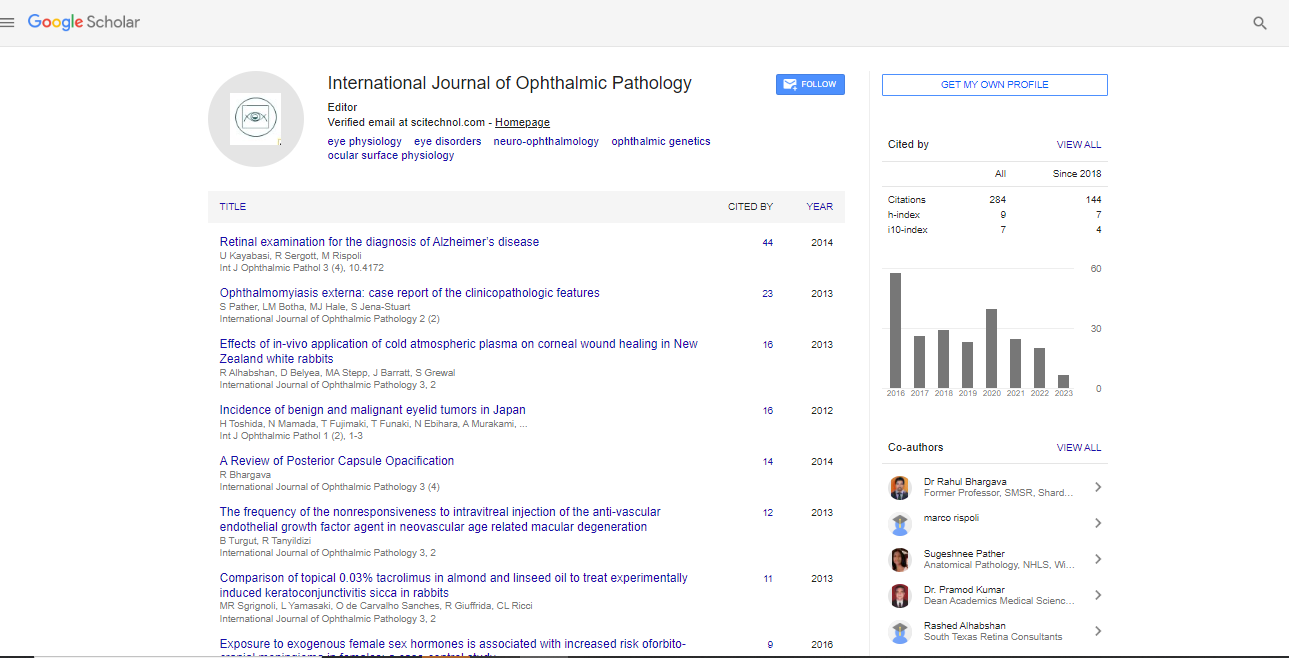Commentary, Int J Ophthalmic Pathol Vol: 12 Issue: 4
Personalized Therapies for Ocular Inflammation
Renshu Aiguo*
1Department of Pharmacology and Neuroscience, University of North Texas Health Science Center, Fort Worth, Texas, United States of America
*Corresponding Author: Renshu Aiguo,
Department of Pharmacology and Neuroscience, University of North Texas Health Science Center, Fort Worth, Texas, United States of America
E-mail: renai@unthsc.edu
Received date: 24 September, 2023, Manuscript No. IOPJ-23-114178;
Editor assigned date: 27 September, 2023, PreQC No. IOPJ-23-114178 (PQ);
Reviewed date: 11 October, 2023, QC No. IOPJ-23-114178;
Revised date: 18 October, 2023, Manuscript No. IOPJ-23-114178 (R);
Published date: 25 October, 2023, DOI: 10.4172/2324-8599.12.4.031
Citation: Aiguo R (2023) Personalized Therapies for Ocular Inflammation. J Ophthalmic Pathol 12:5.
Description
Ocular inflammation, also known as uveitis, refers to a group of conditions characterized by inflammation of the uvea, which is the middle layer of the eye. Ocular inflammation can affect various parts of the eye, including the iris, ciliary body and choroid. While inflammation is a natural response of the immune system to foreign invaders or tissue damage, prolonged or uncontrolled inflammation can lead to serious eye health issues and even vision loss. Managing ocular inflammation is important for preserving eye health and preventing complications.
Ocular inflammation can manifest in different forms, including anterior uveitis (iritis), intermediate uveitis, posterior uveitis (choroiditis) and panuveitis. These conditions can have various causes, such as infections, autoimmune disorders or trauma. Inflammation in the eye can lead to redness, pain, light sensitivity, blurred vision and even vision loss if left untreated. The key to preventing long-term complications lies in effectively managing the inflammation.
Diagnosing ocular inflammation involves a comprehensive eye examination, medical history review and laboratory tests. Ophthalmologists may use advanced imaging techniques, such as Optical Coherence Tomography (OCT), fluorescein angiography and ultrasound, to assess the extent of inflammation and identify its underlying causes. Accurate diagnosis is essential for tailoring a targeted treatment plan.
Managing ocular inflammation is a comprehensive endeavor focused on diminishing inflammation, relieving symptoms and averting complications. Typically, steroid eye drops are prescribed as a primary measure to mitigate inflammation and alleviate symptoms by controlling the immune response in affected eye tissues. In situations of severe or persistent inflammation, healthcare professionals may recommend oral or injectable immunosuppressive medications, which help regulate the immune system and forestall excessive inflammatory reactions.
For more intricate cases of uveitis, biologic drugs are employed, targeting specific molecules within the inflammatory process to obstruct their actions and reduce inflammation. Additionally, to alleviate pain from ciliary spasm and prevent the formation of synechiae (iris-lens adhesions), cycloplegic eye drops are employed.
In certain instances where inflammation-related complications such as cataracts or glaucoma occur and impact vision, surgical interventions may be requisite to rectify these issues and enhance visual function. Managing ocular inflammation can present challenges due to the complexity of the immune response and the potential for recurrent episodes. Implementing the stipulated treatment plans is important for getting the inflammation under control. Additionally, close monitoring by an ophthalmologist is necessary to detect any changes in inflammation and adjust treatment as needed.
Innovations in addressing ocular inflammation encompass the creation of precision therapies, characterized by reduced systemic side effects and improved efficacy. Ongoing analysis endeavors seek to gain a deeper comprehension of the fundamental mechanisms driving ocular inflammation, potentially paving the way for innovative treatment methodologies. Timely identification, swift intervention and effective cooperation between ophthalmologists and rheumatologists (particularly in instances involving autoimmune-linked inflammation) constitute pivotal elements in the successful management of this condition.
Ocular inflammation poses a significant threat to eye health and vision. Effectively managing ocular inflammation requires a tailored approach that addresses the underlying cause, reduces inflammation and prevents complications. With advancements in diagnostic tools and treatment options, ophthalmologists can provide better care to patients with ocular inflammation, leading to improved eye health outcomes and enhanced quality of life. By emphasizing early intervention, patient education and consistent follow-up, the medical community can work towards better eye health and vision preservation for individuals affected by ocular inflammation.
 Spanish
Spanish  Chinese
Chinese  Russian
Russian  German
German  French
French  Japanese
Japanese  Portuguese
Portuguese  Hindi
Hindi 